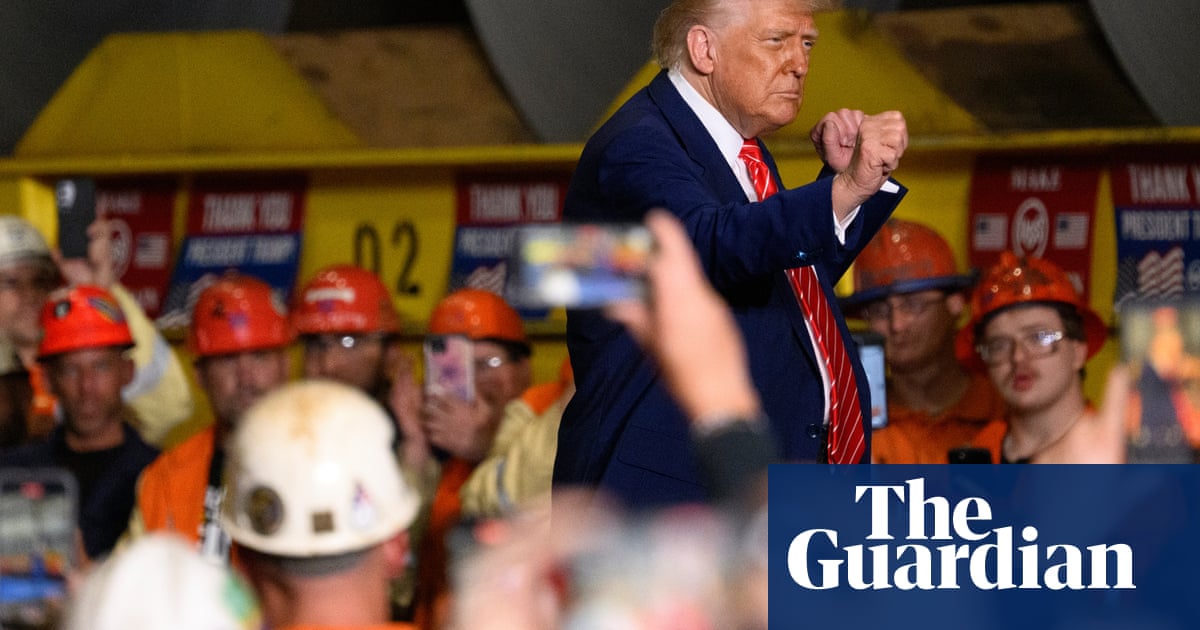Donald Trump, once “totally against” Nippon Steel of Japan’s controversial $14bn takeover bid for US Steel, the second largest US steel producer, is now hailing the deal as a turning point for the struggling industry.
“We won’t be able to call this section a rust belt any more,” the US presidentdeclaredat a plant in West Mifflin, Pennsylvania, on Friday. “It’ll be a golden belt.”
Workers are not holding their breath as they await details. “Our members know from decades of negotiating contracts: trust nothing until you see it in writing,” David McCall, president of United Steel Workers, said in a statement last week.
And veterans of the sector, which has withered for decades, are dubious.
“This is another snake-oil salesman’s pitch to make him look good and reward the billionaires and millionaire executives and stakeholders for US Steel,” said Doug May, who worked for 43 years as a steel worker at a mill in Granite City, Illinois, from the age of 19.
“He’s a proven flip-flopper. Just look at his trade cases: on again, off again.”
Trump ditched his opposition to the deal – which Joe Bidenblockedin January, citing national security concerns – last week, claiming it would create tens of thousands of jobs.
At Friday’sPennsylvaniarally, the president also announced he was doubling US tariffs on foreign steel to 50%. “This will be yet another BIG jolt of great news for our wonderful steel and aluminum workers,” he later claimed on social media.
As Nippon looks to swoop on US Steel, however, staff are still waiting on clarity.
“Are we still going to be employed when this whole thing goes through, and are there going to be improvements to our plant?” Mikayla Prescott, a worker at the Irvin site where Trump spoke on Friday,told the Pittsburgh Post-Gazette.
“If it’s not benefiting the workers,” she added, “then what’s the point?”
Following his retirement in 2016, May has followed international trade deals involving steel and watched the negative impacts offoreign steel importson the US industry.
May said the president “recognized [the] disenchantment and anger” over the decline of the US steel industry but expressed distrust and disapproval of Trump’s rhetoric and promises in supporting the deal.
While the deal is said to include a “golden share” that will be issued to the federal government, details have not been disclosed. US Steel hascharacterizedthe deal as an acquisition.
United Steel Workers, which did not participate in the discussions around the acquisition of US Steel, hasnotedNippon Steel has been found to have violated US trade laws in 13 different cases.
The union’s most recent contract with US Steel, signed in 2022 and set to expire at the end of 2026,represents 11,000 workersat the company.
US Steel bought the Granite City plant, where May used to work, out of bankruptcy in 2003. The plant wastemporarily idledfor months in 2009 due to the recession, the first time in the plant’s over 100-year history, and following another idling of the plant in December 2015, US Steel announced in March 2018 it was reopening the plant,citingTrump’s 25% tariffs on steel imports.
“We are once again pouring American steel into the spine of our country,” the president, then in his first term, declared at a rally at Granite City. “You are the ones who are making America great again.”
May disputed Trump, or his tariffs, as the reason for the reopening, which he suggested was a result of the cyclical nature of the industry. In 2016, the US Steel chief executive had said the plant was idled due to market conditions and that it would be brought back when conditions improve.
“Granite City was going to start back up anyway,” said May. “They don’t just flip a switch just because Trump came to town.”
Despite Trump’s promises in 2018 to bring back “hope and prosperity” to Granite City, problems continued. The plant’s blast furnace wasidledpartially in 2019,then its second was idledin late 2023, which US Steelblamedon the autoworkers’ strike at the big three automakers. United Steel Workersarguedthe decision was a targeted attack on unionized workers.
“If Trump really had steel workers’ backs, he wouldn’t be makinganti-union appointmentsto the National Labor Relations Board,” May added. “He wouldn’t bedecimatingOsha [the Occupational Safety and Health Administration]. He wouldn’t be doing everything he’s done: a long list of things that prove that he’s not supportive of unions.”
May said: “The ‘partnership’ that those at the rally are celebrating, despite scant details of investments being shared, could become your very nemesis in a short period of time. Solidarity with USW leadership and members across the country is critical going forward. Once the shit hits the fan, commitments are unfulfilled,non-union electric arc furnace actionswill be used as a contract bargaining weapon and the rally is a forgotten memory.”
There is a “vast difference between public relations and putting commitments in writing”, McCall, the USW president, said in a statement last week. “Issuing press releases and making political speeches is easy. Binding commitments are hard,” he said.
“The devil is always in the details, and that is especially true with a bad actor like Nippon Steel that has again and again violated our trade laws, devastating steel communities in Pennsylvania and elsewhere.”
US Steel did not respond to multiple requests for comment on criticisms from United Steel Workers on the deal.
